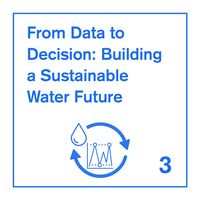Theme 3: From Data to Decision: Building a Sustainable Water Future

In a world facing an escalating crisis of water scarcity and the intensifying pressures of climate change, embracing data-driven decision-making has become paramount for optimizing the utilization of this vital resource - guaranteeing equitable access for all. Real-time information from sensor networks, satellites, and citizen initiatives provides valuable insight into the state of our water resources, both in terms of their quantity and quality. Using an open-science approach fosters transparency and collaboration between researchers, policymakers, practitioners, and communities, breaking down silos and promoting knowledge sharing. Besides, effective knowledge management is key. Data curation, analysis, and visualization transform complex information into actionable insights, empowering stakeholders to proactively navigate water challenges. Particularly universities and research institutions play a vital role as hubs for innovation, research, and capacity building, fostering the next generation of water data experts.
However, utilizing the power of data alone is not enough. While open science and knowledge management unlock the insights from diverse sources, we must go further and consider the broader connections within water resource management. This is where “nexus thinking” comes into play. Recognizing the interconnectedness of water with food, energy, and the environment, we can leverage data to develop integrated (e.g., nature based) solutions or implement hybrid approaches that combine cutting-edge technology with traditional methods. Through combined efforts and the implementation of data-driven approaches, we can achieve optimal water resource management, enhance resilience to challenges, and establish a sustainable future where all have access to this essential resource. Consequently, Theme 3 invites researchers, policymakers, and practitioners to share their insights on data-driven strategies, open science approaches, nexus thinking, and knowledge management.
The contributions and discussions related to information technologies and managing urban water data will focus
particularly on the following aspects:
- Sensing Change: Open Data for Regional Water & Climate
- Transforming Data into Action: Knowledge Management for Water Security
- Connecting the Dots: From Data to Water-Energy-Food Solutions
